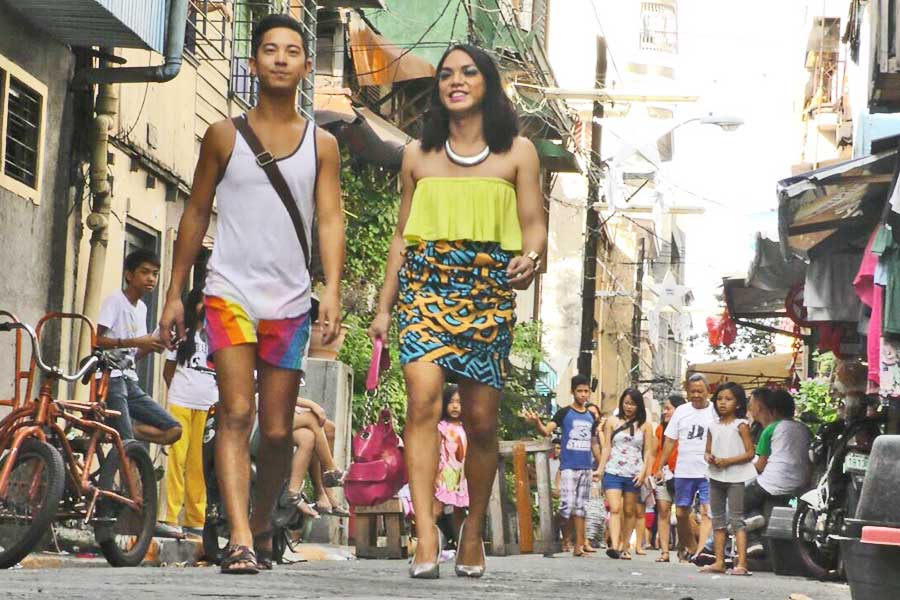The ninth-annual Philadelphia Asian American Film Festival is running at International House and various locations through Nov. 20. The festival will showcase 70 features, shorts and documentaries depicting Asian-American and Pacific-Islander life, food and culture.
This year’s festival includes an LGBT shorts program that will screen at International House at 11:30 a.m. Nov. 12.
“Núôc” (“Water/Homeland”) by Quyên Nguyen-Le is an excellent short about Julian (Rosi Vo), a queer Vietnamese-American teen who is in a darkroom with her girlfriend Jacqueline (Cynthia Callejas). When talk turns to Julian’s refugee mother, Hoa (My Le Ngheim), the dynamic between the two young girls changes. Julian reflects on her mother’s experiences of leaving her homeland and resettling in America. “Núôc” sensitively addresses the experiences of transnationalism using photos, trauma, food and history as touchstones for memory, comfort and unease. This is a lovely, powerful short that aims to debunk stereotypes and treat Vietnam as a country, not a war.
The comedic short “Arranged” features Anita (Anita Kalathara), a young Indian woman whose parents are pressuring her to marry. In fact, they even force Indian suitors, like the charming Mayank (Mayank Bhattar), on her. Anita resists Mayank’s attentions until she discovers that he is gay, and concedes that she needs him to gain her inheritance. If “Arranged,” which was written and developed by its leads, is crudely made and acted, it is still mildly amusing and a pointed commentary on arranged marriage.
“Gaysians,” directed by Vicki Du, is a documentary short that examines Asian-American families as they face generational “dilution” as children of immigrants acclimate to America and lose some of their cultural ties. These American-born children often have no connection to their old-world grandparents and their heritage, except for the conduit that is their parents.
Many of the subjects in the film seek to understand, empathize with and even look past their cultural and generational differences. One interviewee acknowledges that the tradition of having his aging mother move in with him will be tricky given that he wants to live in a queer commune. Another gay man does not want to come out to his traditional parents because of the difficulties he may face as a result. An Indian lesbian learns how to date outside her culture and the ramifications that entails, and a South-Asian transman discusses the shame he senses, only to discover something about his family when he visits his relatives in India. The five stories are all heartfelt and important. It is just disappointing that “Gaysians” is so short; viewers will want to see more fleshed-out portraits of these interesting LGBTQ individuals.
Rounding out the program is the compelling documentary “It Runs in the Family,” which examines the queer members of an extended Filipino family. Vancouver-based director Joella Cabalu documents her gay brother Jay and several of their queer cousins to show how homosexuality runs in the family.
Joella and Jay first visit Monica and her wife Jolly in Oakland, Calif., and they share a close bond. When the siblings travel to Manila in the Philippines — where they have not been for two decades — they connect with Monica’s cousin, Carlo, who identifies as male but expresses his gender as Jazz, a female. Their visit is fascinating not only because of Jazz’s understanding of his gender and sexuality — he does not want to undergo surgery, preferring to dress in female clothes — but also because of how accepting Jazz’s father is. For a family that once spoke of homosexuality as being a “curse,” everyone is surprisingly accepting of Jazz, Monica and Jay.
That idea is tested (but not challenged) as Joella and Jay visiting their other Manila-based uncles, Ronald and Kris. The former is Jay’s godfather, and the latter is a gay man in his 50s whose sexuality is known to family members, even though Kris never “came out.” When Ronald expresses his homophobia, which consists of his concerns about the possibility of raising a queer child, “It Runs in the Family” addresses issues of the generational divide.
Cabalu also asks her interview subjects about how they reconcile their Roman-Catholic faith and their sexuality. The answers here are surprising, as Jay, Monica, Jazz and Kris all have different, but not dissimilar, experiences. Joella observes that Manila is such a predominantly Catholic country, with churches in shopping malls, that attitudes towards sexuality are influenced by religion.
“It Runs in the Family” ends with Jay and Jazz attending a Pride Parade in Manila, and it is an appropriately celebratory way for this gratifying film to express both the diversity and dignity the Cabalu family members have regarding their sexuality and identity.
The Philadelphia Asian American Film Festival runs through Nov. 20 at area locations. For tickets, show times and additional information, visit http://phillyasianfilmfest.org/.
